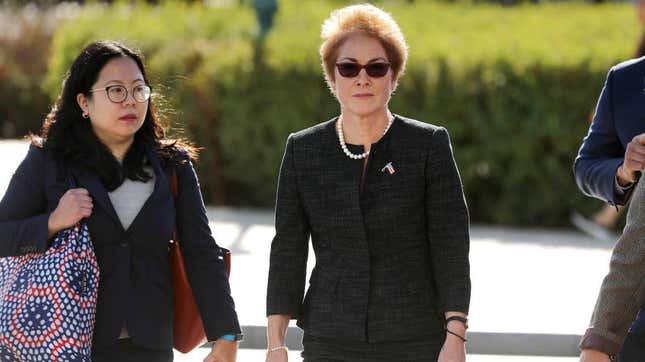
The woman Donald Trump booted this spring from her post as US ambassador to Ukraine told House impeachment investigators Friday that her ouster came about due to falsehoods promoted by forces more concerned about making a dollar than the nation’s security interests.
Marie Yovanovitch arrived on Capitol Hill like a boss, walking openly across the Capitol grounds, accompanied by her own personal legal squad, as opposed to driving up to the entrance of the U.S. Capitol, the Washington Post reports.
Her testimony was in defiance of an edict demanding silence by Trump administration officials when it comes to the House and its impeachment probe into whether Trump illegally sought help from a foreign power, Ukraine, for Trump’s own personal gain—getting dirt on a political rival, Joe Biden.
To get around a directive by her employer—the State Department—not to testify, the House issued a subpoena, with which Yovanovitch opted to comply, according to Politico.
Yovanovitch said that when she was told of her ouster in May by Deputy Secretary of State John Sullivan, he told her that she “had done nothing wrong,” but that there was a “concerted campaign” against her, one based on “unfounded and false claims by people with clearly questionable motives,” Politico reports, citing a review of a copy of her closed-door testimony that the news site obtained.
In her account, Yovanovitch pointed the finger at Trump’s henchman personal attorney, Rudy Giuliani, as the Post reports:
In explaining her departure, she acknowledged months of criticisms made by Giuliani, who had accused her of privately badmouthing the president and seeking to protect the interests of former vice president Joe Biden and his son who served on the board of Ukrainian energy company.
Yovanovitch denied those allegations and said she was “incredulous” that her superiors decided to remove her based on “unfounded and false claims by people with clearly questionable motives.”
Yovanovitch, according to Politico, said of Giuliani, “I do not know Mr. Giuliani’s motives for attacking me,” adding that her contact with him was “minimal.”
But she pointedly went after Giuliani’s associates, speculating, as Politico put it, that she “believed that their personal financial ambitions were stymied by our anti-corruption policy in Ukraine.”
Two of Giuliani’s associates, Lev Parnas and Igor Fruman, were arrested Wednesday on charges of campaign finance violations, and, as the Post reports, Yovanovitch was expected to be asked about the men, noting:
According to an indictment that federal prosecutors unsealed Thursday, the men were working for Ukrainian officials to remove Yovanovitch from her job.
House lawmakers are gathering evidence about Trump’s dealings with Ukraine leading up to and including his call to Ukraine’s president in July during which he asked the president to “do us a favor, though” in looking into business dealings Biden’s son, Hunter, had in the country.
On Friday, per Politico:
Yovanovitch said she was not involved in discussions about Trump’s July 25 call with [Ukraine’s president] or about the military aid, which was temporarily withheld earlier this year. House Democrats are examining whether the critical funds were frozen as a way to convince Zelensky to target Trump’s political rivals.
However, Yovanovitch warned that what happened in Ukraine could set a dangerous precedent for the U.S., according to Politico:
“The harm will come when bad actors in countries beyond Ukraine see how easy it is to use fiction and innuendo to manipulate our system,” she said. “In such circumstances, the only interests that will be served are those of our strategic adversaries, like Russia, that spread chaos and attack the institutions and norms that the U.S. helped create.”



